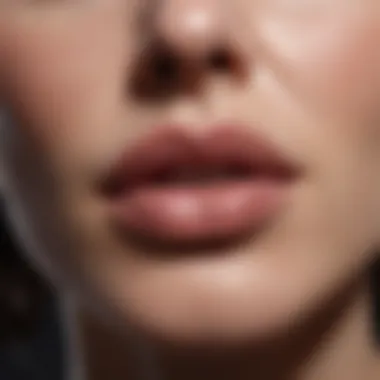Unlock the Secrets to Preventing Lips from Peeling with This Comprehensive Guide


Insider Beauty Tips
When discussing how to prevent lips from peeling, it is crucial to start by delving into the root causes of this issue. Factors such as cold weather, dehydration, and certain health conditions can contribute to dry and flaky lips. Understanding these triggers is essential in formulating an effective prevention strategy. Additionally, incorporating hydrating lip balms and ensuring adequate water intake are fundamental steps in maintaining optimal lip health and preventing peeling.
In the realm of Beauty Hacks, a simple yet highly effective tip is to exfoliate the lips gently with a homemade sugar scrub. This natural exfoliant works to slough off dead skin cells, promoting smoothness and preventing peeling. Moreover, applying a nourishing lip mask before bedtime helps to rejuvenate and moisturize the lips overnight, ensuring they remain supple and free from dryness.
Moving on to Skincare Tips, it is essential to highlight the significance of sun protection for the lips. Just like the rest of the skin, lips are susceptible to sun damage, which can exacerbate peeling. Therefore, using a lip balm with SPF is crucial in safeguarding against UV-induced dryness and maintaining lip health. Furthermore, adopting a gentle cleansing routine for the lips, free from harsh chemicals, aids in preserving their natural moisture barrier.
Understanding Peeling Lips
Understanding Peeling Lips is crucial in the context of this article as it forms the foundation for discussing effective prevention strategies. By delving into the root causes of peeling lips, readers can grasp the significance of implementing preventive measures. This section provides insights into the common triggers behind this issue, allowing individuals to proactively address and mitigate the factors contributing to lip peeling.
Common Causes of Peeling Lips
Dehydration
Dehydration is a prominent factor contributing to lip peeling. The lack of adequate hydration can compromise the skin's barrier function, leading to dryness and flaking. In this article, understanding the detrimental effects of dehydration on lip health is pivotal for devising a comprehensive prevention plan. By highlighting the importance of sufficient water intake and the role it plays in maintaining smooth lips, readers can appreciate the urgency of addressing dehydration to prevent peeling.
Weather Conditions
Weather conditions play a significant role in exacerbating lip peeling issues. Extreme temperatures, low humidity levels, and exposure to harsh elements can strip the lips of their natural moisture, triggering dryness and chapping. Exploring how weather impacts lip health is essential in contextualizing the preventive measures outlined in this article. By emphasizing the need for protective practices against detrimental weather conditions, individuals can safeguard their lips from peeling and maintain optimal moisture levels.


Lip-licking Habit
The habit of frequent lip-licking can paradoxically exacerbate lip peeling concerns. While licking the lips may provide temporary relief, it ultimately worsens dryness and leads to further irritation. Discussing the adverse effects of this habit within the framework of this article sheds light on its contribution to peeling lips. By elucidating the drawbacks of lip licking and promoting alternative solutions, readers can actively work towards breaking this damaging cycle and preserving lip health.
Nutritional Deficiencies
Nutritional deficiencies can have a profound impact on lip health, potentially causing peeling and discomfort. In this article, exploring the role of essential vitamins and nutrients in maintaining lip integrity underscores the importance of a balanced diet. By emphasizing the significance of adequate nutrition for preventing lip peeling, readers can gain valuable insights into the dietary considerations essential for promoting healthy lips.
Impact of Peeling Lips
Discomfort
The discomfort associated with peeling lips can significantly affect daily life and undermine confidence. By addressing the physical discomfort caused by dry, peeling lips, this section offers practical solutions to alleviate symptoms and enhance overall well-being. Emphasizing the need for effective preventive measures can empower individuals to proactively manage lip discomfort and restore comfort.
Cosmetic Concerns
Peeling lips can pose cosmetic challenges, impacting one's appearance and self-image. delving into the cosmetic implications of lip peeling underscore the aesthetic importance of maintaining lip health. By exploring ways to address and prevent cosmetic concerns related to peeling lips, readers can enhance their beauty routines and boost their confidence.
Risk of Infections
The risk of infections due to peeling lips highlights the importance of prioritizing lip care and hygiene. Understanding how peeling lips can create vulnerable entry points for infections is vital in emphasizing the need for preventive measures. By shedding light on the potential risks associated with untreated lip peeling, this section motivates individuals to take proactive steps to reduce infection risks and safeguard their overall health.
Preventive Measures


Preventive measures play a crucial role in maintaining healthy lips and preventing them from peeling. By incorporating a proactive approach towards lip care, individuals can effectively address underlying issues that lead to peeling lips. This section will delve into various strategies and remedies aimed at promoting lip health and reducing the risk of peeling.
Hydration Is Key
Hydration stands as a cornerstone in lip care, influencing their overall condition and preventing issues like peeling. Ensuring adequate water intake is vital for hydrating the body, including the lips. By drinking sufficient water, individuals can combat dehydration, a common cause of lip dryness and peeling. Water helps maintain the skin's moisture levels, promoting soft and supple lips. Additionally, utilizing a hydrating lip balm can create a protective barrier, locking in moisture and preventing excessive dryness. Lip balms enriched with hydrating ingredients like shea butter and hyaluronic acid offer nourishment and hydration, combating peeling and promoting healthy lips. Furthermore, the use of a humidifier can help maintain optimal moisture levels in indoor environments, preventing lips from drying out.
Protective Practices
Protective practices aim to shield the lips from external factors that can contribute to peeling. Sunscreen application is crucial in safeguarding the lips from harmful UV rays, which can cause dryness and damage. Opting for lip balms with built-in SPF protection can offer sun protection while moisturizing the lips. Avoiding harsh weather exposure, such as extreme cold or wind, can prevent moisture loss and lip damage. Implementing a healthy lip care routine, which includes gentle exfoliation and regular moisturization, can contribute to smoother and healthier lips.
Dietary Considerations
Diet plays a significant role in maintaining optimal lip health and preventing peeling. Consuming vitamins and nutrients essential for skin health, such as vitamin E and omega-3 fatty acids, can nourish the lips from within. A balanced diet rich in fruits, vegetables, and healthy fats promotes overall skin health, including the lips. In cases where dietary intake may be insufficient, supplements tailored for lip health can provide an extra boost. However, it is important to consult a healthcare professional before incorporating supplements to ensure they are suitable and safe for individual needs.
Lip Care Routine
In the realm of lip care, having a structured routine is paramount for achieving and maintaining healthy, nourished lips. A robust lip care routine encompasses a series of steps and practices aimed at addressing various aspects that influence lip health. From gentle exfoliation to effective moisturizing techniques, each element of the lip care routine plays a crucial role in combating peeling lips and fostering optimal lip condition.
Gentle Exfoliation
Homemade Lip Scrubs
Homemade lip scrubs hold a prominent position in the task of upkeeping smooth and supple lips. Their natural composition tailored to buff away dead skin cells on the lips is a standout feature. These scrubs, usually crafted from simple ingredients like sugar, honey, and essential oils, offer a gentle exfoliation process without harsh chemicals that could potentially aggravate sensitive lips. Their efficacy in sloughing off dry, flaky skin while nourishing the lips makes them a favored choice among those seeking a natural lip care solution.


Exfoliation Frequency
The frequency at which one exfoliates the lips is crucial in achieving the desired results. Striking the right balance between removing dead skin cells and not over-exfoliating is key in maintaining lip health. Consistent yet moderate exfoliation helps in improving the lip texture, enhancing product absorption, and promoting better lipstick application. Over-exfoliation, on the other hand, may lead to irritation and increased sensitivity, underscoring the significance of being mindful of exfoliation frequency.
Exfoliation Tools
Utilizing suitable exfoliation tools can elevate the exfoliation process in one's lip care routine. Tools like soft, bristle lip brushes or clean, damp washcloths aid in gently buffing away dead skin, revealing softer lips underneath. The effectiveness of these tools lies in their ability to provide a more thorough exfoliation compared to using fingers alone. However, it is vital to choose tools with soft textures to prevent any damage or abrasions to the delicate lip skin.
Moisturizing Techniques
Benefits of Lip Masks
Consulting a Professional
In the journey towards preventing lips from peeling, seeking advice from a professional, particularly a dermatologist, plays a pivotal role. By consulting a professional, individuals can gain valuable insights and personalized recommendations tailored to their specific lip care needs. Dermatologists bring a wealth of knowledge and expertise to the table, allowing them to accurately diagnose underlying issues that may be contributing to lip peeling. Their advice acts as a guiding light, steering individuals towards the most effective solutions for restoring lip health.
Dermatologist's Advice
Underlying Skin Conditions
When it comes to the realm of lip care, addressing underlying skin conditions is paramount. Skin conditions such as eczema, psoriasis, or contact dermatitis can manifest on the lips, leading to persistent peeling and discomfort. By delving into the intricacies of these conditions, dermatologists can uncover the root causes of lip peeling and devise targeted treatment plans. Understanding the nuances of underlying skin conditions equips individuals with the knowledge needed to combat peeling lips effectively.
Treatment Options
Navigating the array of treatment options available for peeling lips requires expert guidance. Dermatologists offer a comprehensive overview of potential treatments, ranging from emollient creams to prescription-strength ointments. Each treatment option comes with its unique benefits and considerations, ensuring that individuals can select the most suitable approach based on their specific condition and preferences. By exploring the efficacy of different treatments, dermatologists empower individuals to make informed decisions regarding their lip care journey.
Professional Recommendations
In the realm of lip care, professional recommendations serve as beacons of wisdom. Dermatologists leverage their expertise to provide tailored advice on product selection, lifestyle adjustments, and maintenance routines that promote healthy lips. These recommendations go beyond mere surface-level tips, diving deep into the intricacies of skincare to deliver holistic solutions. By adhering to professional recommendations, individuals can proactively prevent lip peeling and nurture their lips back to optimal health.







